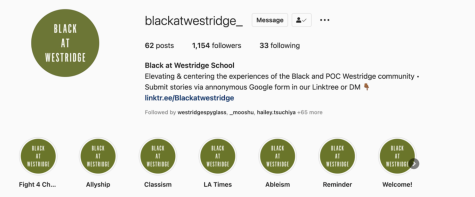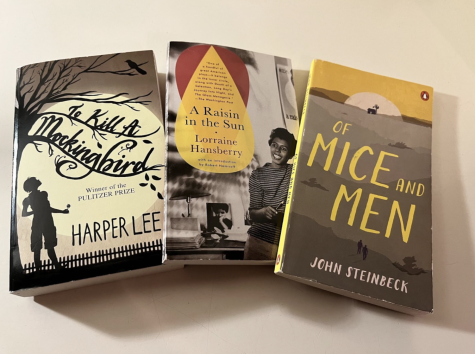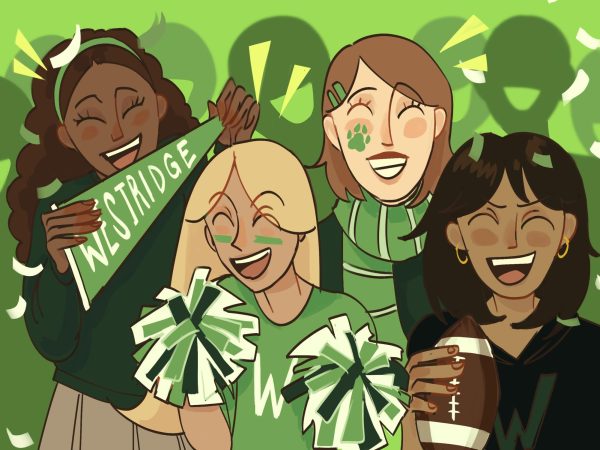Westridge’s Policy on the Use of Racial Epithets Raises Questions About the Line Between Censorship and Protection
Last year Westridge implemented a new policy on the use of racial epithets on campus under the “Anti-Bullying Policy” in the 2021-2022 Student/Parent Handbook. The policy states:
“Racial epithets warrant specific mention. Westridge recognizes the power of language and acknowledges the trauma associated with some words in our society. Racial epithets spoken or read aloud by Westridge faculty, staff, or students, such as the N-word, can materially affect a student’s sense of safety and wellbeing in the classroom and should therefore not be used. The use of primary sources including such epithets is permissible, but only with substantial context-setting and student preparation.”
Although this is the first time the school has officially addressed the use of racial epithets, in practice teachers have always had to negotiate the presence of racial epithets in texts—whether or not those efforts have been sufficient has been reexamined in recent years.
As many stories of racism and microaggressions surfaced on the Instagram account @BlackatWestridge during the summer of 2020, opportunities for reform were brought to light. On September 9, 2020, a group identifying themselves as the Black Westridge Community sent a letter to the Westridge School Board of Trustees, Administration, and Head of School, Elizabeth McGregor. The letter shared testimonies from the account as well as demands for setting up a safer, more inclusive, and more respectful campus. “We demand a zero-tolerance policy for using the N-word on campus or in classrooms,” their third demand stated.

A month later on October 15, 2020, Elizabeth McGregor wrote a letter in response to the Black Westridge Community acknowledging “the scarring effects of racism on our campus.” Starting last year, as part of the school’s strategic plan, they began making official changes, including the introduction of a Director of Equity, Ian Tatum, and the previously mentioned written policy stating that racial epithets should not be used on campus.
Although the policy comes as a response to the school’s desire to mitigate the impact of racial epithets on minority students, specifically Black and African-American students, Ms. McGregor said that such a policy has been considered before.
“It’s been a part of our conversations for years,” said Ms. McGregor. “And then it picked up significantly over the summer of 2020, when people came to us, particularly Black families, alumnae, and students, and said, ‘As a school that has these values, and particularly one of inclusion, this does not make us feel as though we are included in the community, so please could you consider not using it.’ And if we do use it, use it in context, understand the impact that it can have on us, how it can be really offensive and harmful; provide some education around it, particularly to faculty and staff members, about how this can be traumatizing, particularly if you’re one of a few Black people in the class.”
Jennifer Irish, a Middle School History and Human Development Teacher who covers topics ranging from slavery to Japanese internment in her class, spoke to how this policy affects her in her classroom.
“A lot of times it’s really impossible to examine a time period without encountering the language of that time period,” she said. “I have a great documentary that I love and the N-word is said in the background. What I have done is just previewed it and said that this is coming, you will hear this, and kind of giving students the heads up that it’s going to be part of it. For me, I have a hard time covering this content without encountering words that are negative.”
“I am glad that Westridge has a written policy on this because if you really want to take a rule seriously, you should write it down. In that way, it clarifies what not to do,” said Bill Harrison, who teaches U.S. history in Upper School. “The only times that [racial epithets] would come up is in American history since it is possible to read articles that mention the word and are in context to the subject. However, the word is never read out loud, and the policy makes that clear.”
“We’re always very conscious of how language can offend and how it can be used to bully and harass,” said Ms. McGregor. “But it raised us to another level of consciousness about how we need to be more explicit about racial epithets. It’s not new in terms of talking and thinking about it, but it was new in terms of the broader school community internalizing the impact in more profound ways, and the need to provide greater clarity about it in the handbook, for everybody’s sake; if people use derogatory terms, then it can normalize them. Because we’re an institute of education, we need to educate and understand; we need to think very much about intent and impact.”
While the intention of the policy is to protect students from hearing traumatic and painful words spoken aloud, some wonder if such a policy is a kind of censorship. In the last few years, more classics such as To Kill a Mockingbird, Huckleberry Finn, and Of Mice and Men have been removed from various school districts’ reading lists, mainly for their use of racial epithets. In an interview with the Star Tribune, Stephan Witherspoon, president of the Duluth chapter of the NAACP, stated, “Our kids don’t need to read the ‘N’ word in school.” One suggestion has been to use versions of the texts with offensive words edited out.

At the Polytechnic School, around six years ago, when the English Department was choosing the texts for their curriculum, they decided not to include works that explicitly used racial epithets for grades six to nine. “As a group after about several months of discussions, we decided that in our texts from sixth grade up to ninth grade we wouldn’t include texts that used repeated epithets because that kind of language does affect all students, whether it empowers some or disenfranchises others,” said Margaret Kenny, the Chair of the English Department at Polytechnic. “We would never censor books; we would never ban books. But with the age-appropriateness of the classes, we felt that books that did have, perhaps more offensive language, could be handled by those older students, if it was relevant to the course, and if it’s handled with sensitivity and respect in the classroom.”
Policy or not, the “sensitivity and respect” with which texts and language are addressed ultimately falls on teachers. Although Westridge’s English Department did not participate in the drafting of the new policy, Molly Yurchak, Westridge’s Interim English Department Chair, confirmed the need for “substantial context-setting for racial epithets.”
Some argue that these types of policies further oppress marginalized groups in white-dominated spaces. In an article titled “Banning the N-word on campus ain’t the answer—it censors Black professors like me,” published on The Conversation, Vershawn Ashanti Young writes, “To forbid the N-word actually serves the purposes of white supremacy and resuscitates racism rather than defeat it. I say this because we know our society oppresses Black people. But do you know that we are also culturally suppressed in predominantly white spaces? Barring the N-word functions as a too-easy way to quash the six or seven insightful ways the word functions in Black culture.”
“It feels like you’re taking something away from the Black students, something they should be granted the right to say,” said Lauren Lauderdale ’25, a member of the Black Student Union (BSU).
“It’s sort of a code switch going to a school that doesn’t have a lot of people like yourself, and you have to code-switch to try to fit in,” Lauren’s sister Erin ’24, another member of the BSU, added. “And now you’re told that there’s another part of your identity that you can’t use to fit in or that isn’t even allowed to be there.”
“We need to be very careful with the N-word because of how it has been used against Black people,” Ian Tatum said. “We have to ask ourselves who can be impacted when this word is uttered aloud. If you choose to bring that word into the conversation, there has to be a great deal of context setting and understanding that it’s not just an adjective to describe a character. For many people, it has a deep, rich, historical context that is challenging and troubling.”
So can a school create a policy that protects marginalized groups and their freedom of expression? Is it possible to create a policy to support both goals? Westridge isn’t the only school to wrestle with these questions. After the summer of 2020, many more educational institutions began to implement similar policies.
At Polytechnic School, although they have no official policy in their community handbook, they do have a statement of diversity, equity, and inclusion that stresses the importance of treating others with kindness and respect. Ms. Kenny expressed similar concerns about navigating racial epithets in the classroom. “It can be challenging, and I think it’s especially because we also want schools to be and feel safe,” she said. “We don’t want anyone to feel like they cannot speak or that they are being maligned in any way.”
Mayfield Senior is another private high school in the area that does not have a written policy. Still, they focus on bringing awareness to students about the impact of racial epithets in texts. “If there is going be those words in readings, or in any type of work, it’s explained to [the students] that we don’t read that word,” said Cassandra Gonzales, Mayfield’s Director of Justice, Diversity, Equity, and Inclusion. “It will be there in historical documents, and [teachers] give a primer on the violence of that word, bringing awareness of how that can affect students and possibly cause trauma.”
Ileia Gibbs ’22, a co-head of BSU summed up the tension between free expression, academic inquiry, and safety for marginalized voices. She shared her thoughts via email. “I have two opinions about this policy. I personally don’t feel like the N-word should be used in an academic setting as it holds a very triggering past. But on the other hand, I strongly believe that I shouldn’t be restricted by the administration on what I can and cannot say about my own history.”

Eliza is a senior and the Editor in Chief of Spyglass this year. This is her fifth year on staff and her third year as an editor. Outside of Spyglass,...




























![Dr. Zanita Kelly, Director of Lower and Middle School, pictured above, and the rest of Westridge Administration were instrumental to providing Westridge faculty and staff the support they needed after the Eaton fire. "[Teachers] are part of the community," said Dr. Kelly. "Just like our families and students."](https://westridgespyglass.org/wp-content/uploads/2025/03/dr.-kellyyy-1-e1748143600809.png)




























julia • Feb 14, 2022 at 10:13 am
interesting